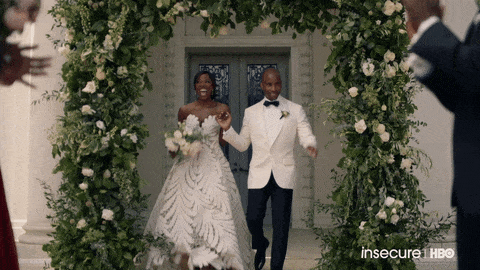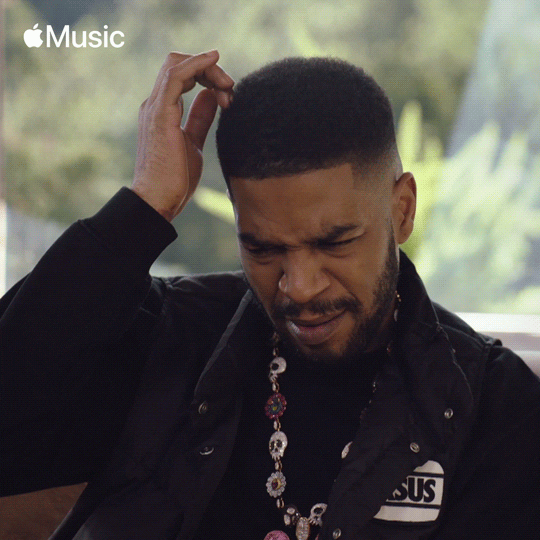
If there’s a contradiction that never ceases to amaze me when it comes to marriage, it’s the fact that it’s typically more women (than men) who desire to get married, and also it’s more women who initiate divorce (around 70 percent, to be exact; some stats say 80 percent within the Black community. Wow). When it comes to all of this, if there’s a consistency that I’ve noticed in the counseling sessions that link these two points, it’s that a lot of women went into marriage thinking it would be one way and then opt to leave when they find themselves being utterly disappointed.
As a matter of fact, that reason tends to come up far more than affairs, abuse, or even financial troubles do. Even though vows are supposed to be sacred and taken very seriously, unfortunately, a lot of people—husbands and wives alike—will break their commitment to their partner simply because they aren’t “feeling it” anymore. I’ve said it many times before because that’s just how much I mean it: unfortunately, the way a lot of people date, it teaches them to get divorced than to be married because they fall in love, break up, move on…fall in love, break up and move on…over and over and over again. So, by the time they do actually say “I do,” it doesn’t hold very much value. And yes, that is unfortunate. Sad even. Sometimes quite tragic as well.
Today, though, we’re not going to get deep into what people should strongly consider before getting married and definitely before getting divorced. No, what we’re going to explore is the fact that while a covenant union is beautiful (and purposeful) beyond measure, it’s also not for the faint of heart. As I also oftentimes say, “marriage ain’t for punks,” and it’s really not. No matter how much you love and (hopefully) like the partner you’ve chosen, there are going to be days when the last thing you want to do is stay married—maybe because you grieve your single life, maybe because of the sacrifices and constant compromising that marriage requires, maybe because marriage wasn’t what you thought it would be.
Whether you’ve been married for two or 20 years, if you clicked on this article because you can totally relate to having moments when you are simply sick and tired of being married, I’ve got some questions that I think you should ask yourself; ones that will hopefully help you to connect some dots and get the fuel that you need to stay in the love/marriage/until death parts us game.
What Was Your Perception of Marriage Before Jumping the Broom?

A quote that I’m not sure is exactly 100 percent true is “perception is reality.” The reason why I say that is because reality is based on truth and facts, and so, just because you see something a certain way, that doesn’t automatically make it factual or rooted in truthfulness (lawd, I could do an entire TED Talk on that alone).
And you know what? Marriage is no exception here. So, let’s start there. When it comes to what you thought marriage was gonna be, did you think you were going to be Cinderella with her Prince Charming (fairy tales, by definition, are stories told to children that aren’t even true. Plus, we don’t know what happened after the “and they lived happily ever after” part)? Maybe you thought it would be reminiscent of your favorite rom-com (that’s a script, and those are characters).
Perhaps you envisioned that it would be like a couple you know (people only tell others what they want them to know; always remember that). Or maybe, you fantasized that it was going to be more about someone giving you all of what you want and you doing very little or, as I tell brides often, that you were going to be a bride all of your life instead of just for one day (the rest of the time, you’re supposed to be a wife).
The reason why this question is super important is that it’s important to separate perception from reality/facts. Because sometimes, people leave marriages, not because anything is necessarily “wrong”; it’s simply because they have been so caught up in what they thought it would be that they lost sight of what it really is. The Bible often refers to this as “vain imaginations” — the ego feeding the mind with all kinds of random ideas…oftentimes ones that are so unrealistic that it causes people to participate in self-sabotaging behaviors.
Why Did You Get Married?

I’m not sure if I have a favorite Tyler Perry movie. I’ll just leave that where I put it (as a writer, I’m a big fan of people who actually hire writers, feel me). What I will say is a movie of his that I’ve seen, lawd, how many times has BET played it is Why Did I Get Married? and when it comes to what we’re discussing today, that’s something else that definitely needs to be explored to the utmost.
As a marriage life coach, I’ve talked to women who got married solely because they didn’t want to be single moms; women who didn’t want to deal with financial stresses and pressures alone; women who just assumed that was what they were supposed to do (either due to family, religion or social pressure); women who were afraid of being alone (this includes not wanting to be the only unmarried friend); women who thought that marriage had so many more perks than single living (eh, depends on who you ask and when you ask them) — the list is endless.
Here’s the thing about this particular point: when you know your why, it’s easier to navigate through your when and what. Example. I know a wife who got married (young) because she hated her home life, and she knew that her husband adored her. Problem was, he felt more strongly about her than she did about him, and so, when he lost his job, he wasn’t able to spoil her like he used to because she didn’t love him as much as he loved her, so she left.
A big part of the reason why she left is that her “why” was pretty shaky right out of the gate. See what I mean? Sitting within yourself in your “why” can be extremely revelatory. Definitely make sure that you do it.
Why Did You Marry…HIM?

There’s marriage. Then there’s the person you got married to. That said, there’s someone in my world who is currently going through a divorce (actually, sadly, there are a few folks). Something that she is currently unpacking is this very question. Oh, the layers. One is that the way he dated her isn’t the way he acted after marriage (he got lazy, he got entitled, he got assuming). Another is she ignored several red flags, thinking that they would just…go away (like his really unhealthy attachment to his mother). Another is because she believed he would support her career when he turned out to just want to control it.
Y’all, this is reason one billion why premarital counseling is crucial (for starters, you have a 30 percent higher success rate if you participate in some). When you’re all caught up in how someone makes you feel, you need an objective person to basically be like, “I mean, that’s cool ‘n all, but you do know that marriage is about a lot more than that…right?” And then, throughout your marriage, you should at least see a reputable marriage therapist/counselor/life coach a couple of times a year to “take y’all’s temperature” to make sure that things are still running (relatively smoothly).
Anyway, the thing about this particular wife is she and her husband have been in some form of therapy their entire marriage. I know him personally and can vouch for the fact that he’s arrogant and unteachable (basically because he thinks he knows better than everyone else). She’s also realized that she was looking for him to feel voids to the point where she didn’t make the time to get to know him better. And now she gets that her reasons for choosing him had very little to do with him at all. The therapy that she is getting outside of her marriage has revealed that she picks men who sweep her off of her feet only to expect her to do most of the heavy lifting once a commitment is in place — and she keeps doing that because she’s a colossal people pleaser...and people-pleasing is oftentimes tied into trauma.
She’s leaving her marriage because he refuses to actually let therapy do its job (he does it more to pacify her than anything else), and they really are at a stalemate because of it — and that has led to constant retraumatization for her, so I get it. However, when it comes to a lot of other women, they will just leave without looking into the mirror and tackling this question. That’s unfortunate, too, because if you don’t get the answer(s) to this one, a new man/marriage isn’t going to change anything. Chances are, all you’re gonna do is pick the same guy over and over again — because you’re on an internal loop that needs some work.
What About Him Has Changed Since Saying, “I Do?”

Not too long ago, I was having a conversation with a friend of mine about how we’re trying to figure out how to meet each other’s needs now that they’ve both changed quite a bit since we first became close. I’m telling you that it isn’t addressed enough that one of the main reasons why so many long-term relational dynamics hit walls is because one or both people expect the other person to always remain the same.
Not only is that unrealistic, but it also isn’t fair. And to make matters worse, it can be the ultimate gaslight to try and make someone feel bad for changing just because it might “shake up” your idea of them or result in you having to learn how to become more flexible when it comes to adjusting to their…shifts.
Listen, life is about evolving, and no one is designed to remain stagnant. So, if a part of what’s got you stressin’ is the fact that your man isn’t who he used to be, is that honestly a bad thing, or have you just gotten so comfortable that you don’t want to learn how to adjust?
In order for you to answer this question, you’re going to have to really think about how he’s changed — and then you’ve got to be honest with yourself that if the changes are improvements that require you to do some growing up…that’s a good thing. On the other hand, if the changes are simply different and unfamiliar, that’s what you need to discuss with him — not berate or condemn…simply discuss.
What About You Has Changed Since Saying, “I Do?”

When it comes to relationships, I’ve shared before that one of my favorite quotes is, “People change and forget to tell each other.” Keeping this in mind, just like he’s changed, it’s fair to say that you have as well — and the interesting thing about marriage is sometimes two people change at different times and paces.
I think that’s why a lot of people will end their marriage and simply chalk it up to “Hey, we grew apart” when it really isn’t that simple. Even the Bible says that when a husband and wife get together, they “shall become one” (Genesis 2:24-25), and there is absolutely no timetable for that. That’s because marriage, Scripturally, is designed to last until death parts two individuals (a foreign concept these days, I know). And that’s a huge part of the reason why The Love Chapter of the Bible starts off by saying that “love is patient” (I Corinthians 13:4) and patient is where the big kids play.
Patient: bearing provocation, annoyance, misfortune, delay, hardship, pain, etc., with fortitude and calm and without complaint, anger, or the like; quietly and steadily persevering or diligent, especially in detail or exactness.
And this is why I oftentimes find myself rolling my eyes when folks profess how “in love” they are very early on because if it’s not shown with patience, I highly doubt that its roots go very deep.
All of what I just said, it’s setting the stage for how to handle things if you’ve realized that you’ve changed. Just like you should evaluate how your changes have impacted you, your man, and the relationship, you also need to talk to him about how he feels about said changes because looking for a way out under the guise of “we grew apart” is not honoring your vows or giving your marriage a fair shake.
Besides, it’s okay to change — to not be the same woman you were on your wedding day. What’s not okay is not communicating how all of that has altered needs, wants, and expectations. And so, instead, you just…leave.
What Kind of Tired Are You?
 Tired Black Girl GIF by MonA Hayslett - Find & Share on GIPHYGiphy
Tired Black Girl GIF by MonA Hayslett - Find & Share on GIPHYGiphy"Tired" is an interesting word. The reason why I say that is it doesn't have just one general meaning. It can mean that you're fatigued. It can mean that you're bored (check out "Bored All Of The Time? Here's What's Really Going On.”) An informal definition is that you're disgusted.
So, you already know where I'm going with this particular point, right? If you feel like you're tired of being married, another thing to ponder is what kind of tired are you? Don't just assume that the word itself is all-encompassing or a good enough reason to end it because, if you're fatigued, that's to be expected. A lot of things wear us out — rest and rejuvenation can get us back on track.
If you're bored, yeah… that's not a good enough reason to end a marriage either. In fact, that's got all kinds of immaturity written all over it because to break a promise, to end such a significant union (and, let's be real, business arrangement) and, if you have children, to intentionally put them at the well and long-term documented odds that come with the brokenness of divorce (you can read about some of it here, here, here and here), being bored just isn't good enough.
Now if you're disgusted — that is something worth unpacking on a few different levels. Are you disgusted with how your spouse is acting or not acting? Are you disgusted that you've shared your needs, and they keep going unmet? Are you disgusted by the fact that nothing seems to change no matter how much you want them to? Maybe you're disgusted with yourself for being so…disgusted. Perhaps there are things that you've been hiding from your spouse that you're disgusted about.
If disgust is the issue, it's time to speak with a professional. And in the meantime, you've probably heard somewhere before that it's never wise to make serious decisions when you're tired, hungry, or angry. Pinpoint what's got you feeling the way that you do, manage your emotions with a mental health specialist, and then decide where to go from there.
What Do Your Vows Mean to You…Now?

Sometimes, I feel like one of the best things that could ever happen to two people who are experiencing a low spot in their marriage is that they really think about what a vow is. It's not just something you say. A vow is rooted in serious intent. A vow is rooted in integrity. A vow is something that goes beyond how you feel at any given time. A vow is defined as being "a solemn promise, pledge, or personal commitment." And if you got married believing that God was a part of the union, it's also "a solemn promise made to a deity or saint committing oneself to an act, service, or condition," and there's a Scripture that speaks on that part:
"When you make a vow to God, do not delay to pay it; for He has no pleasure in fools. Pay what you have vowed—Better not to vow than to vow and not pay." (Ecclesiastes 5:4-5 — NKJV)
So, let's say that you said traditional marriage vows during your ceremony:
"In the name of God, I, _____, take you, _____, to be my wife/husband, to have and to hold from this day forward, for better, for worse, for richer, for poorer, in sickness and in health, to love and to cherish, until parted by death."
When you said it, did you mean it? And when it comes to where you stand now, do you still mean it? If so, what can you do to push through the "tiredness?" If not, what are you gonna do about the fact that you took vows and vows are nothing to play with?
You know, we live in a culture where very few people live by the code "my word is my bond" anymore. How much stock do you put into your marriage vows? How much does your husband? It's something else worth discussing with him as soon as possible.
Would Life Actually Be Better After Leaving or Just…Different?
 Giphy
GiphyYou know, it’s been reported that at least one-third of individuals who get divorced end up regretting their decision. One reason is that the person you were going into your marriage isn’t the person you are going out and the dating pool tends to shift drastically over the course of time. Another reason is that if you don’t do some serious self-introspection, hopping into another relationship isn’t going to change much.
In fact, divorce rates tend to jump almost 20 percent per remarriage. Another reason is that, even if you don’t feel about your partner the way you once did, oftentimes it’s still irrefutable that they are a good person — and good people can be hard to come by out in these streets.
So yeah, let’s end here. If you’re tired, you don’t need to ignore that. Being tired is definitely signaling some things. Yet before throwing in the towel (or doing something that could jeopardize your marriage, like cheating), please don’t romanticize that things would be better if you left.
If that’s what you’re thinking, this is something else to tackle with a therapist/counselor/life coach so that you can see past the rose-colored glasses of what you think reality would be like into the facts of the truth. Because, oftentimes, leaving a marriage doesn’t make life better; it just makes things different…and the differences can come with a whole ‘nother set of issues that can end up wearing you out too.
_____
Yeah, I know this was A LOT to tackle, yet hopefully, if tired of being married is exactly what you’re feeling right now, this all has given you some real food for thought.
In the meantime, remember that being tired is oftentimes fleeting.
Ending a marriage? It is not.
Please choose wisely, sis.
Let’s make things inbox official! Sign up for the xoNecole newsletter for daily love, wellness, career, and exclusive content delivered straight to your inbox.
Featured image by JGI/Jamie Grill/Getty Images
- 10 Men Told Me How They Feel About "Marriage Pressure" ›
- What Should You Do If You Feel Like You Married The Wrong Person? ›
This Is How To Keep 'Holiday Season Stress' From Infecting Your Relationship
Hmph. Maybe it’s just me, but it seems like there is something really weird happening in the fall season air (because winter doesn’t officially begin until December 21) that cuddle season is in full swing while break-up season is as well. In fact, did you know that break-ups are so popular during the holiday season that December 11 is deemed Break-Up Day?
The reasons why relationships shift around this time vary; however, I did both roll my eyes and chuckle when I read that a very popular one is because it’s an easy way to get out of getting one’s significant other a Christmas present. SMDH.
Anyway, I personally think that the less shallow folks out here may contemplate calling things “quits” or they at least distance themselves a bit from their partner (and what I’m referring to is serious relationships) due to all of the stress and strain that oftentimes comes with the holidays whether it be financial, familial, due to their tight schedules or something else.
Listen, I would hate for you and your man to miss the fun and happiness of experiencing this time of year, all because you are so overwhelmed or irritated that you can’t really enjoy it. That’s why I have a few practical tips for how to avoid allowing the typical holiday season stress from INFECTING your relationship.
Manage Your Expectations
 Giphy
GiphyUnmanaged expectations. If there is a main reason why the holiday season tends to be so stress-filled for so many people, I’d bet good money that this is the cause. And when you’re in a long-term relationship, expectations can manifest themselves in all sorts of cryptic and/or unexpected ways. You might have relatives who assume that you are going to be with them for Thanksgiving or Christmas when you have other plans in mind. You might be thinking that you are going to spend one amount for presents while your man is thinking something totally different. When it comes to scheduling, your signals may be crossed.
And you know what? To all of these scenarios, this is where clear and consistent communication come in. Don’t assume anything. Don’t dictate anything either. From now until New Year’s, mutually decide to check in once a week, just to make sure that you are both on the same page as it relates to the holidays and what you both are thinking will come along with it. The less blindsided you both feel, the less stressed out you will be. Trust me on this.
Set (and Keep) a Budget
 Giphy
GiphyOkay, so I read that last year, 36 percent of Americans incurred some type of holiday-related debt. Hmph. Last year, there was still some sense of normalcy in this country, chile, so I can only imagine what finances are gonna look like over the next several weeks. That said, since I don’t know a lot of people who don’t find being broke stressful, make sure that you and your bae set a budget and then stick to it this year — no ifs, ands or buts.
Because really, y’all — it doesn’t make sense to deplete savings and/or max out credit cards for a few days of giggles only to be damn near losing your mind because you don’t know how to make ends meet come Dr. Martin Luther King, Jr. Day.
And by the way, this tip doesn’t just speak to things like food and gifts; I also mean travel. If it doesn’t make a ton of sense (or cents) to be all over the place this year — DON’T BE.
Keep Matthew 5:37 at the Forefront
 Giphy
GiphyIf off the top of your head, you don’t know what Matthew 5:37 says, no worries, here ya go: “But let your ‘Yes’ be ‘Yes,’ and your ‘No,’ ‘No.’ For whatever is more than these is from the evil one.” That verse right there? Oh, it’s a boundaries lifesaver! I say that because do you see “maybe” or “I’ll think about it” in there? Nope. LOL. It says that you should tell people “yes” or “no” and leave it at that — and that complements Anne Lamott’s quote, “’No’ is a complete sentence” impeccably well. Yeah, you’ve got to remember that anything beyond a yes or no to a request is privileged information; you don’t owe anyone details or an explanation.
Besides, if you are really honest with yourself, when someone asks you something and you give a “Umm, let me think about it” kind of reply, more times than not, you already know what your answer is going to be — so why not let you both off of the hook? Give your response. Commit to that. And let everyone (including yourself) get on with their lives and schedules.
I promise you that when it comes to those holiday parties, you are pissing more folks off by not RSVP’ing or doing so and not showing up than just saying, “Thank you but not this year” off the rip.
Remember That Your Personal Space Is Privilege Not a Right
 Giphy
GiphyA friend of mine recently bought a new house and invited me over to come see it. He’s a single man with no children, so as I was taking in all of the space that he had, especially as I walked through his finished basement, I joked about relatives coming to live with him. “Hell no” and “absolutely not” were pretty much his immediate responses as he went on to say that some folks even had the nerve to be offended when he told them that he had no intentions on taking DNA in.
Ain’t it wild how people think that your stuff is their right? And yes, that brings me to my next point. Your home is your sanctuary space. If you want to host folks this year — cool. If not, ALSO COOL. Please don’t let folks (family included) guilt you into how they want you to act or even into what they would do if the shoe was on the other foot. You are not them — and as one of my favorite quotes states, “If two people were exactly alike, one of them would be unnecessary.” (A man by the name Larry Dixon said that.)
Hell, my friends? They know that I am good for sending them random things that they need or even want all throughout the year. Coming over to hang out at my pace, though. Uh-uh. Chalk it up to being a card-carrying member of the ambivert club yet I like keeping my living space personal — and I sleep like a baby, each and every night, for feeling that way.
Always remember that your space, your time, your resources, your energy and shoot, yourself period (including your relationship), are all things that are your own. You get to choose how, when and why you want to share them. The holiday season is certainly no exception.
Cultivate Some “You Two Only” Traditions
 Giphy
GiphyIt’s not uncommon for some couples to hit me up after the holiday season to “detox.” Sometimes it’s due to the financial drama (and sometimes trauma) that they experienced. Sometimes it’s because they allowed their relatives (especially in-laws) to get more into their personal business than they should’ve. More than anything, though, it tends to be because they didn’t get enough quality time together and so ended up feeling “disconnected.”
Please don’t let that happen. Listen, I’m not even a holidays kind of woman and yet, I will absolutely sit myself down with some hot chocolate and chocolate chip cookies to enjoy a Hallmark holiday film or two. Aside from the fact that most of them are lighthearted and sweet, I also like that they usually focus on couples loving on each other amidst all of the holiday beauty and ambiance — which is something that all couples should set aside some time to do.
Maybe it’s a vacation. Maybe it’s a staycation. Or maybe it’s my personal favorite, A SEXCATION. Whether it’s for a few days, the weekend or even overnight — don’t you let the holidays go by without setting aside time for you and your man to celebrate one another. Don’t you dare (check out “Are You Ready To Have Some Very Merry 'Christmas Sex'?”).
GET. SOME. REST.
 Giphy
GiphyI once read that 8 out of 10 people get stressed out over the holidays and 3 out of 10 lose sleep during to it — and when you’re stress-filled and sleep-deprived, that can absolutely lead to hypersensitivity, making mountains out of molehills and even not being in the mood for sex.
Your relationship can’t afford to go through any of this, so definitely make sure to prioritize rest. I don’t care how unrealistic it might seem during this time, sleep should never be seen as a luxury; it will always and forever be a great necessity.
That said, try to get no less than six hours of shut-eye in (check out “6 Fascinating Ways Sex And Sleep Definitely Go Hand In Hand”) and even ask your bae to take a nap with you sometimes (check out “Wanna Have Some Next-Level Sex? Take A Nap, Sis.”). Not only will sleep help to restore your mind, body and spirit but, when it’s with your partner, it’s an act of intimacy that can make you both feel super connected, even in the midst of what might feel like chaos.
___
Holiday season stress is real. Still, never give it the permission or power to throw your relationship off. Put you and your man first and let the holidays be what they are gonna be, chile.
Let’s make things inbox official! Sign up for the xoNecole newsletter for love, wellness, career, and exclusive content delivered straight to your inbox.
Featured image by Shutterstock
I wish I enjoyed drinking plain ole’ water. I don’t, though, and, at this point, I doubt that I ever will. It’s not something that I’m proud of or anything, but like I’ve said in other articles on this platform, to me, water is so damn boring; it’s literally like drinking “wet air.”
That doesn’t mean I don’t accept that it’s a “necessary evil” being that we all are made up of so much water and being dehydrated (which is something that a lot of us are) can cause so many health-related issues, including blurred vision, muscle cramps, dried skin, fatigue and even moodiness.
That’s why, over the years, I’ve been intentional about figuring out ways to get more agua into my body without feeling like it’s a chore or something to dread. And now, I want to pass some of those hacks on to you, just in case you happen to totally relate to where I am coming from.
If something that you want to do more of right through here is get extra H2O into your system, here are 10 tips that can absolutely help to make that possible.

Unsplash
1. Invest in a Fun Water Bottle
There’s a far greater chance that you are going to drink water if you have a water bottle around you. So, cop yourself a cute one — one that will help you to stay motivated. A tumbler that I purchased some time back, just because I thought it was cute as hell, simply says, “Make Better Coochie Decisions” (amen?-LOL). Honestly, that doesn’t just have to apply to sex but how you treat your vagina overall — and that includes making sure that “she” has all of the fluids that she needs.
2. Try Some Sparkling Water or Mineral Water
At this point, I should take stock in Waterloo. It currently is my favorite kind of sparkling water and it has definitely made getting more water into my system easier to do. That’s because I will add some limes to it or a bit of fruit juice to it and that makes drinking water less “meh” for me. Another type of water that has bubbles in it is sparkling mineral water; it can also be beneficial since it contains magnesium, potassium and calcium.

Unsplash
3. Go Halfsies with Your Other Drinks of Choice
Speaking of making some all-natural soda (which is basically what happens when you add juice to sparkling water or sparkling mineral water), you can find yourself drinking more water while consuming less calories if you fill up your glass with half of your favorite fruit juice and half of some sparkling water. More times than not, the juice doesn’t even taste watered down. Try it before you doubt me.
4. Collect Some Infused Water Recipes
I’m forever gonna be a fan of infused water; that’s because it’s water that has fresh fruits and/or veggies in them — and it doesn’t get any healthier than that. Plus, infused water tends to take on the taste of whatever fruits or vegetables that you put into the water (if you let the stuff soak for a couple of hours), so that the water doesn’t taste so boring and bland. Wanna try a few recipes? You can check out some here and here.

Unsplash
5. Make Slushies Instead of Smoothies
Are you someone who enjoys consuming smoothies? Well, if you want to get more water into your system, how about going with a slushie instead? Although it is true that some smoothies have water as a base, the most bomb ones use milk (or a milk alternative) or yogurt. Slushies, on the other hand, typically go with crushed ice (which is frozen water) instead. That said, some (pardon the pun) cool slushy recipes can be found here, here and here.
6. Use Water As Your “Drink Chaser”
Another great thing about water is it can help to keep you from overeating; it does that by causing you to feel full if you drink it while you are eating. And speaking of calorie-counting, if you don’t want to give up your favorite drink at mealtime, one way to keep from downing 2-3 glasses of it at a time is to use water as your “chaser.” What I mean by that is, after enjoying a glass of your favorite beverage, “chase it down” with a glass of water. That should satisfy your want for what you want without overdoing it.

Unsplash
7. Eat Foods That Are High in Water Content
Another way to get more water into your body is to eat foods that have a ton of water in them. Some that top the list include lettuce (96 percent); cucumber (95 percent); zucchini (95 percent); celery (95 percent); strawberries (91 percent); cantaloupe (90 percent), and peaches (89 percent).
8. Have a Ball with Your Ice Cubes
Ice cubes are frozen water, right? That’s why most of us prefer to enjoy our drinks before the ice cubes melt because melted cubes water down whatever it is that we are consuming. And so, for this very reason, add more ice cubes to your drinks — and have fun making them. You can add juice, fruit and/or mint leaves while making your cubes. That way, they are aesthetically-pleasing; plus, they will also add more flavor to your water once the ice cubes actually melt.

Unsplash
9. Add Some Non-Alcohol Cordial to Your Water
If you’re fine with just having a tad of taste in your water, why not add a bit of cordial to it? Cordial is simply a type of tonic, syrup or sweetener (that can contain alcohol or not) that can help to make your water more…interesting. Some alcohol-based cordials can be found here. Some non-alcoholic recipes are located here.
10. Technically, Herbal Tea Counts
Tea is always gonna be my thing. That’s why I’ve penned articles on it for the site like “10 Different Ways Herbal Teas Can Fit Into Your Beauty Regimen”, “10 'Uncommon' Teas You Should Add To Your Stash (& Why)” and “I've Got 10 Teas That Will Help You To Age (Even More) Gracefully” And y’all, if you want to get a lot more water into your system yet a tall glass of water only isn’t your — pardon the pun — cup of tea, make some iced herbal tea instead.
It’s basically water with some herbs tossed in and, if you add some honey or raw organic coconut palm sugar to it, it will be a really sweet treat that will still be extremely hydrating (and very healthy) for you.
Water that is a bit more exciting for you…now. LOL.
Drink up!
Let’s make things inbox official! Sign up for the xoNecole newsletter for love, wellness, career, and exclusive content delivered straight to your inbox.
Featured image by Unsplash









